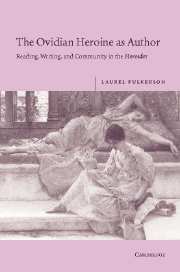Book contents
- Frontmatter
- Contents
- Acknowledgments
- List of abbreviations
- Introduction
- 1 Reading dangerously: Phyllis, Dido, Ariadne, and Medea
- 2 Reading the future?: Hypsipyle, Medea, and Oenone
- 3 Benefits of communal writing: Canace and Hypermestra
- 4 A feminine reading of epic: Briseis and Hermione
- 5 Reading magically: Deianira and Laodamia
- 6 Reading like a virgin: Phaedra and Ariadne
- 7 Caveat lector: thoughts on gender and power
- Appendix: The authenticity (and “authenticity”) of Heroides 15
- Bibliography
- Index
- Index Locorum
5 - Reading magically: Deianira and Laodamia
Published online by Cambridge University Press: 22 September 2009
- Frontmatter
- Contents
- Acknowledgments
- List of abbreviations
- Introduction
- 1 Reading dangerously: Phyllis, Dido, Ariadne, and Medea
- 2 Reading the future?: Hypsipyle, Medea, and Oenone
- 3 Benefits of communal writing: Canace and Hypermestra
- 4 A feminine reading of epic: Briseis and Hermione
- 5 Reading magically: Deianira and Laodamia
- 6 Reading like a virgin: Phaedra and Ariadne
- 7 Caveat lector: thoughts on gender and power
- Appendix: The authenticity (and “authenticity”) of Heroides 15
- Bibliography
- Index
- Index Locorum
Summary
While prior chapters have suggested a relatively straightforward model of community, in which the women of the Heroides deliberately reframe their own stories in light of those they have found either appealing or familiar from other women in the Heroides, this chapter will offer a different version of the model, suggesting that sometimes influence is less voluntary and also that the “monotony” of the collection may have roots in a cause more sinister than the conscious adaptation of compelling models. The tales of Deianira, Medea, and Laodamia have a number of common elements – primary among them is the death in all three women's stories – and those elements will be shown to hint at a more pernicious connection between the three. This chapter, admittedly more speculative than those that precede it, suggests that the three heroines share a bond not only of entwined textuality, but also of supernatural causality.
Building on the links between magical and poetic carmina, this chapter first explores the characterization of Laodamia in Heroides 13 as intrigued by the supernatural, and then surveys some of the similarities between her letter and Deianira's. This will lead to the suggestion that Laodamia may have read Deianira's story and “learned” from it that when your husband dies, you should too (especially if, as I shall argue is true for both Laodamia and Deianira, you have caused that death).
- Type
- Chapter
- Information
- The Ovidian Heroine as AuthorReading, Writing, and Community in the Heroides, pp. 107 - 121Publisher: Cambridge University PressPrint publication year: 2005

